February 18, 2015 | Grand Hyatt | 1000 H St. NW| Washington, DC
The Federal Mobile Computing Summit was held on February 18, 2015 at the Grand Hyatt in Washington, D.C. Below is media coverage from the event.

Federal agencies are interested in pursuing “bring-your-own device”, or BYOD, programs because many see this as the next step in federal mobility, but clear policies and cost-benefit analysis are needed, according to discussion at a mobile conference held earlier this year.
A report, released publicly last week, summarizes three collaborative sessions – including one on federal policy and technology challenges and opportunities for a BYOD program – that took place during the Federal Mobile Computing Summit in February. The non-profit Advanced Technology Academic Research Center, or ATARC, and the Mitre Corp. held the conference in Washington, D.C., and prepared the report. (Full story)
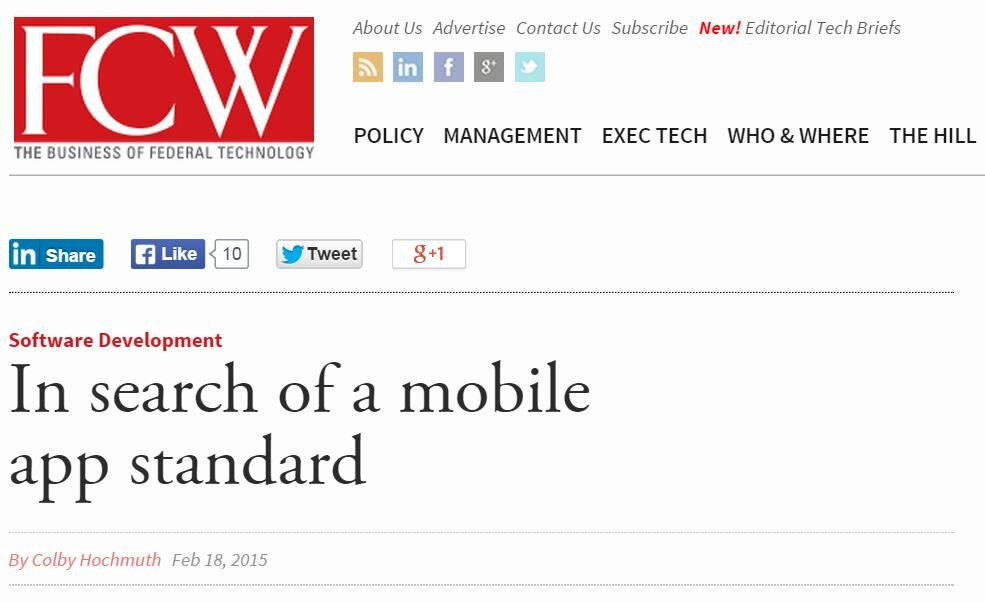
The CIO Council’s Mobile Technology Tiger Team has released a set of criteria for federal agencies to vet mobile applications. The goal is to create more consistency among agencies in their vetting standards and enable industry to better meet agency needs by following a single standard for application development for federal customers.
Robert Palmer, acting deputy executive director of the Enterprise Systems Development Office at the Department of Homeland Security and co-chairman of the tiger team, made the announcement at the Federal Mobile Computing Summit in Washington on Feb. 18. (Full story)
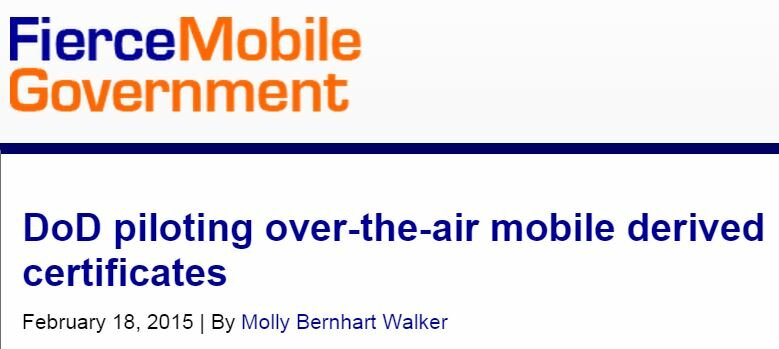
The Defense Department is running a small-scale mobile device security pilot that could enable the department to move away from common access card readers for mobile devices by July.
The pilot of 14 iOS devices uses soft certificates, which place a digital certificate on a device via a registry or file system, in the native keystore, said Greg Youst, chief mobility engineer at the Defense Information Systems Agency.
“We had a PKI implementation memorandum come out from DoD CIO that basically said we are going to put all our focus on doing derived certificates into the keystore,” said Youst, who spoke Feb. 18 at the Federal Mobile Computing Summit in Washington, D.C. (Full story)

Officials at the departments of Justice and Homeland Security typically expect employees’ smartphones will be bugged when they travel overseas. So, they are experimenting with various ways to neutralize foreign spy gear.
When DHS personnel travel, “we understand you go there, you go to Ukraine, you come back, there’s a good chance that the BlackBerry or any other device, Androids, iOS, whatever, is probably owned. We get that,” said Vincent Sritapan, a cybersecurity division program manager at the DHS Science and Technology Directorate. At Justice, officials plan to try before-and-after bug checks of gadgets. “You take that scan before the trip, they go on the trip, they come back, you take a scan afterward and you compare it,” said Kennet Ake, Justice’s acting assistant director for end-user devices.
The two men spoke Wednesday at the Federal Mobile Computing Summit in Washington. (Full story)
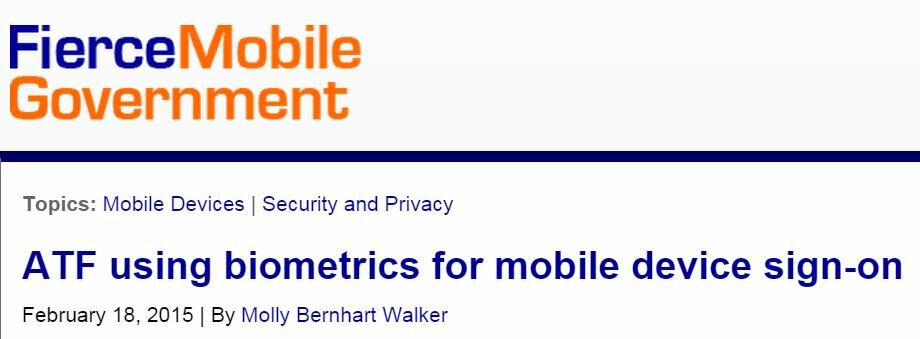
Employees at the Bureau of Alcohol, Tobacco, Firearms and Explosives can now use a biometric tool in lieu of a password to sign on to their mobile devices.
The agency is using Touch ID, the Apple-based fingerprint scanner built in to the sapphire home button of iPhones. The biometric identity tool is found on the iPhone 5S, iPhone 6 and 6 Plus, the iPad Air 2 and iPad Mini 3.
ATF recently refreshed all of its mobile devices from iPhone 4S to iPhone 6, said Rick Holgate, ATF’s assistant director of science and technology.
“The main motivation there was refreshing several-years-old technology, but also embracing Touch ID as a way of enhancing the convenience of use of the devices,” said Holgate, who spoke Feb. 18 at the Federal Mobile Computing Summit in Washington, D.C. (Full story)

The ultimate goal is to make it easier and safer for agencies to develop and use mission-critical applications on smartphones or tablets. Rob Palmer, the lead of the Mobility Technology Tiger Team and the Homeland Security Department’s director of information assurance, said the CIO Council will choose the National Information Assurance Partnership’s (NIAP) protection profile for mobile apps as the standard for government.
“The NIAP program would be the place where we are going to house all the work that’s been done into that place where we can consistently review it, revise it, and that is something that has industry involvement in it,” Palmer said Wednesday at the Federal Mobile Computing Summit sponsored by Mobilegov in Washington. “Industry can contribute to it. It’s not just a federal guideline that is pushed, but it’s an interactive and iterative process.” (Full story)

TIGER TEAM RELEASES CRITERIA FOR AGENCIES’ MOBILE APP SECURITY — The CIO Council “tiger team” tasked with improving the government’s use of mobile technology has released new criteria for federal agencies to use when vetting the security of new mobile applications, according to Federal Computer Week. Robert Palmer, acting deputy executive director of the Enterprise Systems Development Office at DHS and co-chairman of the tiger team, made the announcement at the Federal Mobile Computing Summit in Washington yesterday. (Full story)

WASHINGTON, D.C.–With reports estimating the number of devices connected to the Internet of Things at 25 billion to 50 billion by the year 2020, we’re well on our way to an always-connected world.
But the more devices are connected through networks, the more entry points there will be for dangerous elements. If IoT is to flourish safely and securely, the private and public sector must work in concert to create a regulated yet creative environment, a panel at the Federal Mobile Computing Summit concluded here Wednesday. (Full story)

As government ponders its place in the landscape of the Internet of Things, some feds are pointing to APIs as a good place to start.
The federal government already has more than 6,000 APIs, short for application programming interfaces, on which the public can build applications. Gray Brooks, a senior API strategist with the General Services Administration’s 18F, argues that instead of trying to keep up with the evolution of the Internet of Things, government should focus on its role as an information and API provider.
“One of the things the government does well is aggregate and provide information and certain functionality, and that truly is irreplaceable,” Brooks said during a panel Wednesday at the Federal Mobile Computing Summit.

WASHINGTON, D.C.–An important component for many businesses, the field worker, is too often skipped over in mobile app plans. But by upgrading the workflows of those workers, one organization not usually known for its efficiency–the federal government–has found just that through custom mobile apps, according to a panel held here Wednesday at the Federal Mobile Computing Summit. (Full story)
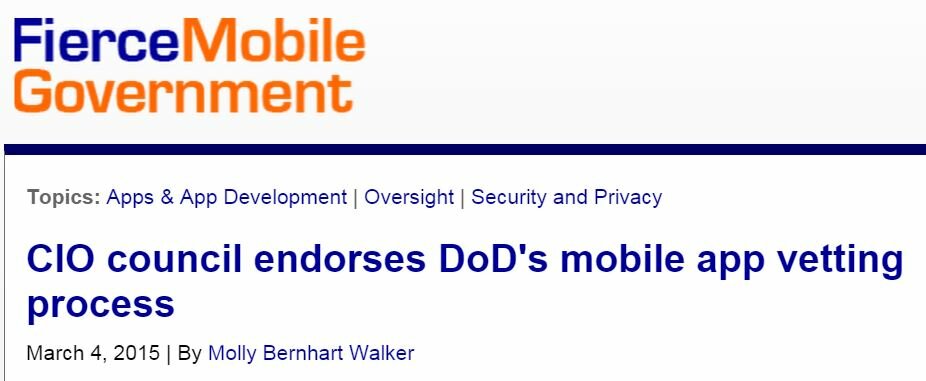
The Federal Chief Information Officer’s Council recommends agencies use a methodology employed by the Defense Department for their mobile application vetting needs.
The CIO Council endorses the National Information Assurance Partnership’s protection profile for mobile apps as the standard for government agencies, announced Rob Palmer, the Homeland Security Department’s director of information assurance.
Palmer, the lead on the CIO Council’s Mobility Tiger Team, spoke Feb. 18 at the Federal Mobile Computing Summit in Washington, D.C. (Full story)
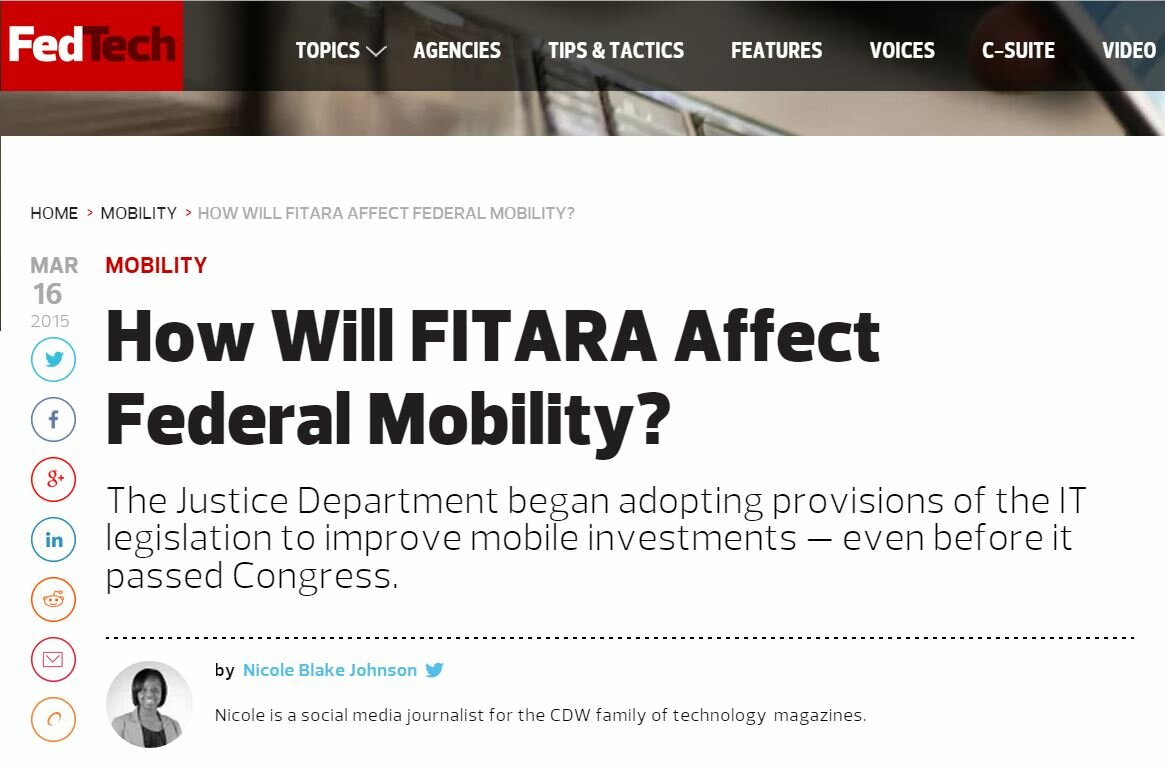
One of the expected benefits of the Federal Information Technology Acquisition Reform Act (FITARA), which Congress passed in December, is that agencies will have better visibility into their IT costs and greater traction in adopting common solutions that boost efficiencies.
One area of federal IT that is ripe for this level of oversight: mobility.
“The mobility nut has yet to be cracked…, but we are making progress on that,” said Jon Johnson, program manager for enterprise mobility programs at the General Services Administration, addressing participants at last month’s Federal Mobile Computing Summit in Washington, D.C. Some agencies don’t have a good grasp of what devices and data plans they have and how they are used, he explained. Most agencies are defaulting to unlimited plans because they don’t know what they have. (Full story)
